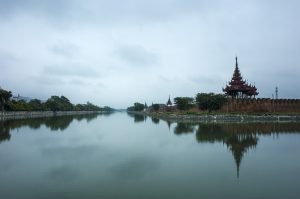Myanmar’s anti-regime forces are being re-deployed to the south, north, and east of Mandalay amid rising expectations of a coming battle with the military aimed at wresting control of the old capital from the ruling junta by the end of the year.
Militias from Kayin (Karen) State in the southeast and Shan State in the north were ordered this week to reinforce Mandalay’s flanks after securing significant battlefield victories elsewhere in the war-torn country, sources with the People’s Defense Force (PDF) told The Diplomat.
“People are selling up their personal belongings in Mandalay. They don’t want to see a repeat of what happened in Lashio. Everyone evacuated their homes as Lashio was falling and they lost all their possessions, including their pets, their dogs,” a PDF source said. “They were too late.”
The source said that the capture earlier this month of Lashio, the largest city in northern Shan State, by the Three Brotherhood Alliance had enabled the redeployment. People’s Defense Forces (PDFs) that are currently training with the Karen National Liberation Army (KNLA) will also be dispatched to support an offensive on Mandalay, the source added.
“They’re building up a force to take Mandalay and the generals within the EAOs and PDF are telling us that they want to capture Mandalay before the end of 2024,” she said, adding the Ta’ang National Liberation Army (TNLA) from the Three Brotherhood Alliance was also sending troops.
With the fall of Lashio the military lost control of its Northeast Regional Command and a major defense garrison, which sent soldiers scurrying and enabling a broader framework to be established for a tilt towards Mandalay.
Some 20 Ethnic Armed Organizations (EAOs), including the KNLA and the three armed groups that make up the Three Brotherhood Alliance, as well as their PDF allies, have recorded a series of stunning victories since launching a dry season offensive last November.
They now control nearly all of Myanmar’s ethnic states, long stretches of the country’s borders with Thailand, Laos, China, Bangladesh, and India, and about 75 major towns and cities.
The major exceptions are Yangon, Naypyidaw, and Mandalay in the Irrawaddy Basin, the traditional home of the military which ousted an elected government in early 2021 and tipped the country into civil war.
EAO troop deployments are also on the back of recent battlefield victories by the Mandalay PDF. Last weekend, it launched offensives on three townships, 100 kilometers southwest of Mandalay, seizing a Chinese-owned oil and gas pipeline, a police station, and a garment factory used as a junta post.
Meanwhile, NUG-backed militias captured nine military posts near Thabeikkyin, about 100 kilometers north of Mandalay, on the Irrawaddy River. These were small gains in the overall context of the three-and-a-half-year conflict but the PDF source said rebel militias were now poised.
“Mandalay will be next and the EAOs-PDF including the Karen who are sending forces north are confident that it will be taken before the end of this year. After that it’s difficult to say where next but Naypyidaw and Yangon are the obvious choices,” she said.
Should Mandalay fall, then the international political dynamics should also change in favor of the exiled National Unity Government (NUG) and its struggle for recognition among regional players, in particular India, China, and the Association of South East Asian Nations (ASEAN).
China is still pushing the prospect of elections – even if restricted to areas under military control – India has stuck with the military by closing its borders, and ASEAN’s Five-Point Consensus has been reduced to barely a talking point when leaders and foreign ministers meet.
In fact, ASEAN has proved infuriating and contributed little to any peace effort. Its sole focus has been negotiations with the military. One negotiator, a former prime minister, has apparently offered refuge for the military’s chief Min Aung Hlaing, if required.
Like most wars, Myanmar’s conflict is a battle of perceptions. Mandalay, the historical seat of kings until the British annexation in 1885, remains the country’s cultural center and its importance can not be discounted. Whoever controls Mandalay will lay claim to the country.

































